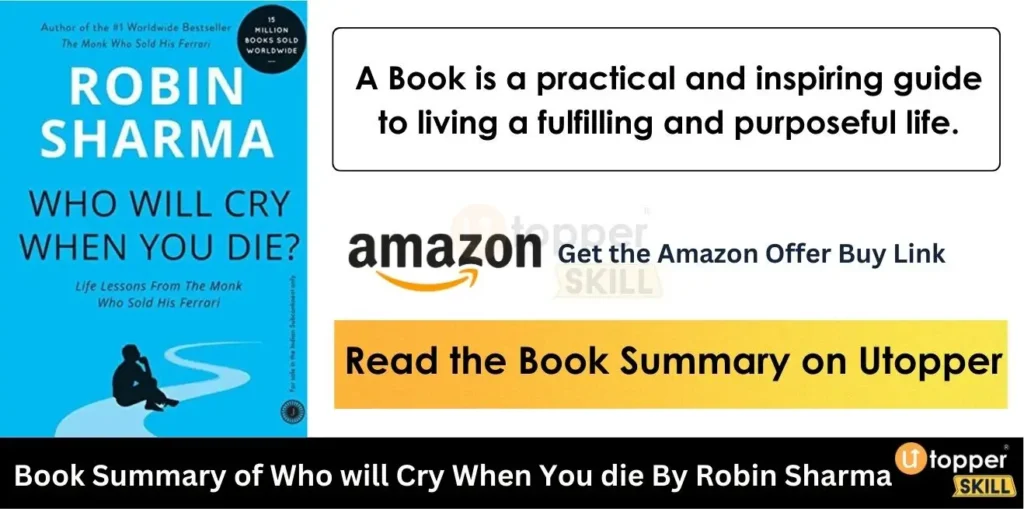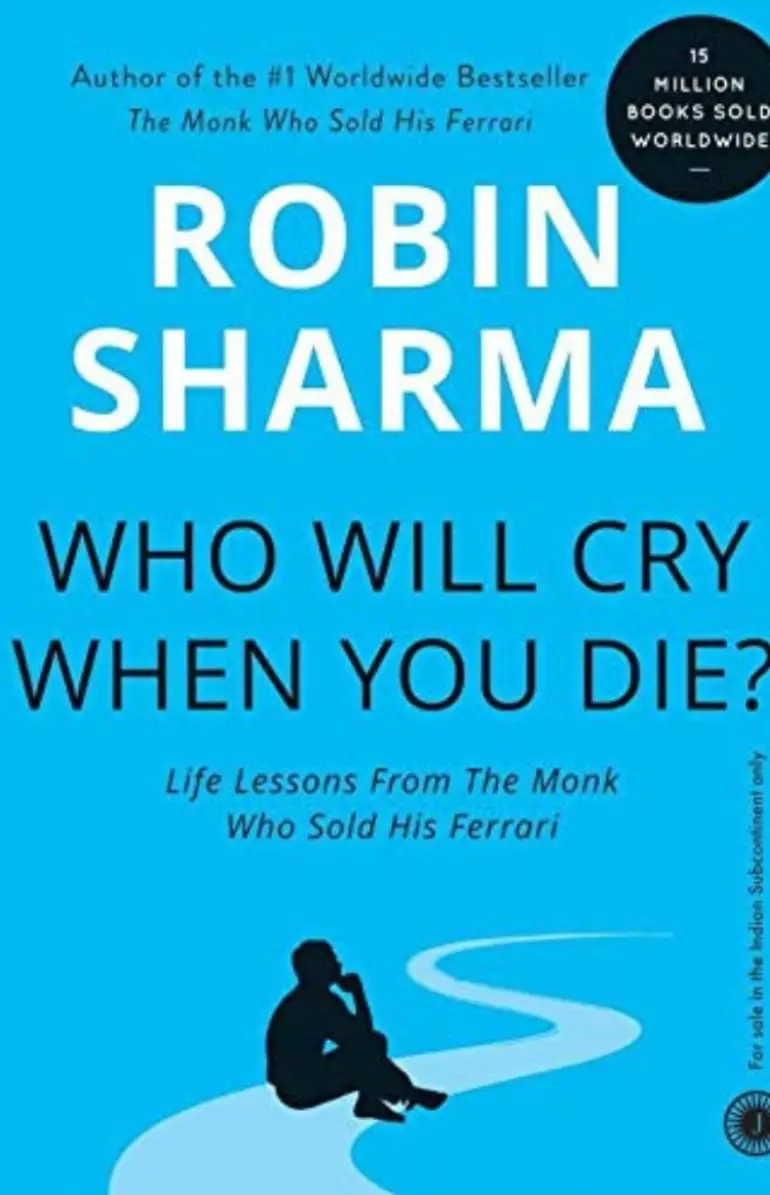Book Summary of Who Will Cry When You Die

“Who Will Cry When You Die?” is a self-help book by Robin Sharma that offers practical advice on living a fulfilling life. In this article, we are Writing a Book Summary of Who Will Cry When You Die , 1 Line summary of Who Will Cry When You Die, the Best quotes of Who Will Cry When You Die and the Best Lines of Who Will Cry When You Die.
In this book, Sharma provides 101 simple solutions for everyday life that aim to help the reader achieve personal and professional success, happiness, and fulfillment. The book is divided into short chapters that can be read in any order, making it easy for readers to incorporate the advice into their daily lives.
1 Line Summary of the Book
“Who Will Cry When You Die?” by Robin Sharma is a practical and inspiring guide to living a fulfilling and purposeful life.
Brief Summary of “Who Will Cry When You Die?”
In the first chapter, Sharma emphasizes the importance of having a sense of purpose in life. He encourages readers to reflect on their values and beliefs and to set goals that align with their innermost desires.
In the subsequent chapters, Sharma covers a wide range of topics, including the importance of maintaining a positive attitude, the benefits of meditation and mindfulness, the power of gratitude, and the need for self-discipline.
Sharma also stresses the importance of developing healthy habits, such as exercise, healthy eating, and getting enough sleep. He provides practical tips on how to incorporate these habits into daily life.
Throughout the book, Sharma emphasizes the importance of living in the present moment and enjoying life to the fullest. He encourages readers to take risks, pursue their passions, and embrace change.
The book also includes practical advice on building strong relationships, both personal and professional. Sharma provides tips on how to communicate effectively, resolve conflicts, and build trust.
In the final chapter, Sharma encourages readers to live a life of service, to give back to others, and to make a positive impact on the world. He reminds readers that the legacy they leave behind is determined by the lives they touch and the difference they make.
Chapters Summary of “Who Will Cry When You Die?”
Introduction
Life is a precious gift that we have been given. However, it is not always easy to live it in a way that brings us joy and fulfillment. In his book, Who Will Cry When You Die?, author Robin Sharma provides readers with practical advice and insights to help them live a life of purpose, meaning, and happiness.
In this article, we will summarize the key points of the book and highlight important paragraphs that provide valuable insights to readers. We will cover topics such as cultivating a positive mindset, creating a daily routine, building relationships, and finding your life’s purpose.
Chapter 1:
The first step to living a fulfilling life is to cultivate a positive mindset. In Chapter 1, Sharma emphasizes the importance of starting the day on a positive note. He recommends starting each day with a morning ritual that includes some form of physical exercise, meditation, and gratitude practice.
“By starting your day with a morning ritual, you set yourself up for success. You set a positive tone for the day and give yourself the energy and focus you need to tackle any challenges that may arise.”
Chapter 2:
Sharma also stresses the importance of practicing kindness and compassion towards others. In Chapter 2, he writes about the power of giving and how it can transform our lives. He suggests finding ways to give back to others, whether it’s through volunteering, donating to charity, or simply performing small acts of kindness.
“Remember that true success is not measured by what you have, but by what you give.”
Chapter 3:
In addition to cultivating a positive mindset, Sharma also emphasizes the importance of creating a daily routine. In Chapter 3, he writes about the power of having a “Daily 5” – five key activities that you do every day to help you achieve your goals.
“Your Daily 5 should include activities that nourish your body, mind, and soul. This could include things like exercise, reading, meditation, journaling, and spending time with loved ones.”
Chapter 4:
Sharma also stresses the importance of setting goals and creating a plan to achieve them. In Chapter 4, he provides readers with a framework for setting and achieving goals, which includes defining your vision, breaking down your goals into actionable steps, and holding yourself accountable.
“Remember that a goal without a plan is just a wish. If you want to achieve something, you need to create a roadmap that will guide you towards success.”
Chapter 5:
Another key aspect of living a fulfilling life is building meaningful relationships. In Chapter 5, Sharma emphasizes the importance of surrounding yourself with positive people who inspire and support you.
“Your relationships are a reflection of who you are. If you want to live a positive and fulfilling life, you need to surround yourself with positive and uplifting people.”
Chapter 6:
Sharma also stresses the importance of forgiveness and letting go of grudges. In Chapter 6, he writes about the power of forgiveness and how it can transform our lives.
“Forgiveness is not just about letting go of the past. It’s about freeing yourself from the pain and anger that holds you back. When you forgive others, you give yourself the gift of peace and freedom.”
Chapter 7:
Finally, in Chapter 7, Sharma writes about the importance of finding your life’s purpose. He emphasizes that we all have a unique gift to share with the world and that it’s our responsibility to discover what that gift is and share it with others.
“Your purpose is not something that you find, it’s something that you create. It’s up to you.
BUY “Who Will Cry When You Die?”
It is a practical and inspiring guide to living a fulfilling and purposeful life.
Conclusion
“Who Will Cry When You Die?” is a thought-provoking and inspiring book that provides practical advice on how to live a meaningful and fulfilling life. It is a must-read for anyone who wants to make the most of their time on earth and leave a positive legacy.
Best Quotes of “Who Will Cry When You Die?”
- “The purpose of life is a life of purpose.”
- “You can’t build a reputation on what you are going to do.”
- “The person who tries to live alone will not succeed as a human being. His heart withers if it does not answer another heart.”
- “Everything is created twice, first in the mind and then in reality.”
- “Success lies in the quality of the output you produce, not just the amount of work you pour into it.”
- “Happiness is a journey, not a destination.”
- “The more you give to life, the more life gives back to you.”
- “Be the change you wish to see in the world.”
- “Spend the first hour of the day on yourself.”
- “Your days are your life in miniature. As you live your hours, so you create your years.”
Best Lines of “Who Will Cry When You Die?”
- “The purpose of life is a life of purpose.”
- “The quality of your life ultimately depends on the quality of your relationships.”
- “The more you exercise your character muscles, the stronger they get.”
- “Small daily improvements over time lead to stunning results.”
- “We are all here for some special reason. Stop being a prisoner of your past. Become the architect of your future.”
- “Don’t live the same year 75 times and call it a life.”
- “Change is hardest at the beginning, messiest in the middle and best at the end.”
- “The real measure of your wealth is how much you’d be worth if you lost all your money.”
- “Your I can is more important than your IQ.”
- “What you focus on grows, what you think about expands, and what you dwell upon determines your destiny.”
“Who Will Cry When You Die?” By Robin Sharma

It is a practical and inspiring guide to living a fulfilling and purposeful life
- “The purpose of life is a life of purpose.”
- “The quality of your life ultimately depends on the quality of your relationships.”
- “The more you exercise your character muscles, the stronger they get.”
- “You can’t build a reputation on what you are going to do.”
- “Everything is created twice, first in the mind and then in reality.”
- “Success lies in the quality of the output you produce, not just the amount of work you pour into it.”
Lessons to learn from “Who Will Cry When You Die?”
- Have a sense of purpose: Discover your true calling and align your goals with your values and beliefs.
- Live in the present moment: Don’t dwell on the past or worry about the future. Focus on the present and enjoy life to the fullest.
- Practice gratitude: Appreciate the good things in your life and express gratitude for them. This will help you to stay positive and motivated.
- Develop healthy habits: Exercise regularly, eat healthily, and get enough sleep. These habits will help you to maintain your physical and mental well-being.
- Maintain a positive attitude: Cultivate a positive mindset and focus on the good in every situation. This will help you to overcome challenges and achieve your goals.
- Embrace change: Don’t be afraid of change. Embrace it and see it as an opportunity for growth and personal development.
- Build strong relationships: Develop meaningful relationships with those around you, both personal and professional. Communicate effectively, resolve conflicts, and build trust.
- Serve others: Give back to others and make a positive impact on the world. Your legacy will be determined by the lives you touch and the difference you make.
- Take risks: Pursue your passions and take calculated risks. Don’t be afraid of failure, as it is an opportunity for learning and growth.
- Learn continuously: Keep learning and growing throughout your life. Read books, take courses, and seek out new experiences. This will help you to stay motivated and achieve your goals.
Frequently Asked Questions on “Who Will Cry When You Die?”
Q.1 What is “Who Will Cry When You Die?” about?
“Who Will Cry When You Die?” is a book by Robin Sharma that provides practical advice on how to live a fulfilling and meaningful life. It is divided into 101 short chapters, each containing insights and guidance on a specific aspect of personal development and self-improvement.
Q.2 Who is the author of “Who Will Cry When You Die?”
The author of “Who Will Cry When You Die?” is Robin Sharma, a leadership and personal development expert who has written several other books on the subject, including the bestselling book “The Monk Who Sold His Ferrari.”
Q.3 What are some of the topics covered in “Who Will Cry When You Die?”
“Who Will Cry When You Die?” covers a wide range of topics related to personal development, including the importance of having a sense of purpose, maintaining a positive attitude, developing healthy habits, building strong relationships, and living in the present moment. The book also provides guidance on meditation, mindfulness, gratitude, and self-discipline.
Q.4 Is “Who Will Cry When You Die?” a self-help book?
Yes, “Who Will Cry When You Die?” can be classified as a self-help book, as it provides practical advice and insights on personal development and self-improvement. However, it is not a typical self-help book, as it is divided into short chapters that can be read in any order, and it focuses on living a meaningful and fulfilling life rather than just achieving personal success.
Q.5 Who would benefit from reading “Who Will Cry When You Die?”
Anyone who is interested in personal development and self-improvement would benefit from reading “Who Will Cry When You Die?” The book is also recommended for those who feel stuck in their lives or are looking for guidance on how to live a more fulfilling and purposeful life.
